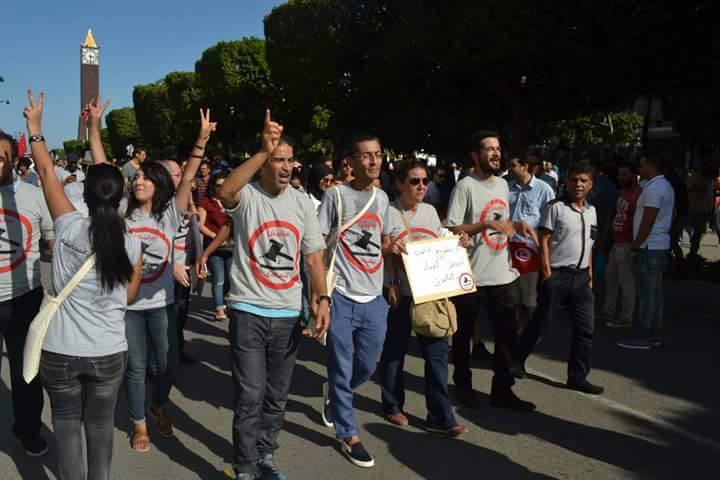Civil society can make transitional justice its own cause. One example is in Tunisia, where the Manich Msamah movement (meaning “I will not forgive”) is campaigning against a draft law on “economic reconciliation” which would in effect absolve corrupt officials and businessmen close to the old regime. The movement’s campaign is in the street and its weapon of choice is social media.
Olfa Belhassine, JusticeInfo’s correspondent in Tunisia, writes that Manich Msamah quickly set up a Facebook page “bringing together jurists, teachers, students and unemployed people with diplomas, whose average age is 25”. “Driven by a taste for politics, but also irreverence and independence with regard to the authorities, the young activists of Manich Msamah work in a dynamic way,” she says. “Their favourite tools are humour, caricature and sarcasm, used without moderation in their campaigns on social media to explain what is wrong with the bill on economic and financial reconciliation.”
This Bill, proposed by President Beji Caied Essebssi himself, is due to be debated for approval by Parliament after Ramadan. Manich Msamah has relaunched opposition to this amnesty law, which is a little too generous to be honest.
Also highlighted this week was a conference in The Hague on what UNESCO Director-General and candidate for UN Secretary General Irina Bokova calls “cultural cleansing”. In Syria, Iraq, Afghanistan, Mali and elsewhere, the destruction of heritage is not just “collateral damage” but a “tactic of war”, she argues.
On August 22, the International Criminal Court (ICC) is due to start its first trial on destruction of historic monuments, the mausoleums of Timbuktu, as a war crime. The person accused is Malian Touareg Ahmed Al Faqi Al Mahdi (known as Abou Tourab), who was head of the Timbuktu Islamic morality brigade during the occupation of northern Mali by Islamic militia from April 2012 to January 2013.
Another sign against impunity was a decision by a French court giving new hope to relatives of disappeared victims that suspected perpetrators of the “Beach massacre” in the Republic of Congo may one day be held accountable. The case involves some 353 people who were held and transferred to camps in Brazzaville river port – dubbed the Beach − in 1999 by security forces. None of them ever came back from these camps.
On June 3, French judicial authorities declared themselves competent to try General Norbert Dabira, who was inspector general of the Congolese armed forces at the time and has a residence in the Paris area. Dabira was previously acquitted by a Congolese court after a trial seen as a parody of justice. Victims’ associations have also filed a complaint against the Congolese Head of State himself, President Denis Sassou-Nguesso. He too could now be prosecuted.






